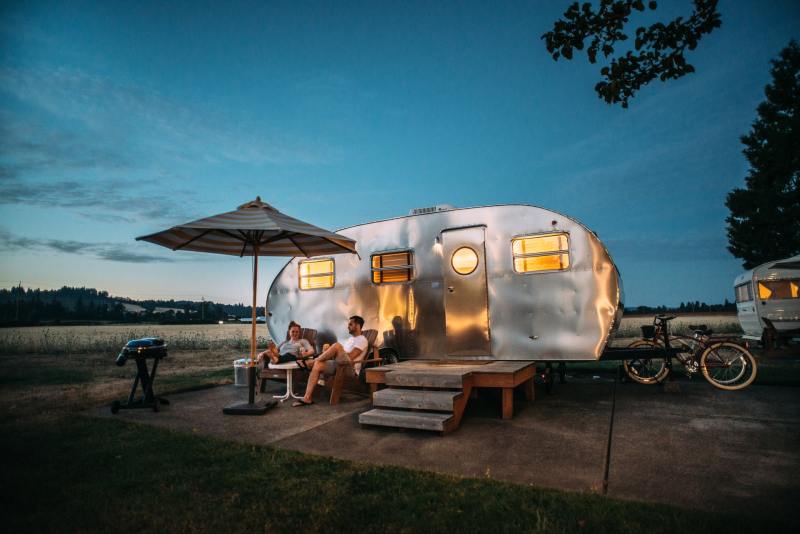A road trip is the perfect opportunity to step out of your comfort zone. On the best trips, every day is exciting, novel, inspiring, and Instagram-worthy. But travel can also be stressful, tiring, frustrating, and unpredictable. It’s one thing to deal with these things on your own. But adding a partner into the mix changes the dynamic. It can make things a lot more interesting, sometimes for the worse.

Our best advice when traveling with your partner
Here’s how to survive a long-distance RV road trip with your significant other (without killing each other).
Don’t let it be a “compatibility test”
Above all else, be honest with each other about what’s involved in a long-distance road trip. A six-week, cross-country RV trek isn’t the time to learn that you and your significant other are not quite as compatible as you thought. Hard travel days have a way of bringing out a different side of people. That can put a strain on even the healthiest relationships.
Take a “shakedown trip”
If you’ve never traveled in an RV or in an RV with your partner, plan a “shakedown trip” — a trip close to home to test things out together in your new rig — before committing to a long-distance journey. This will let you both experience living in a confined space with one another. If you don’t yet have an RV, consider renting one to get the whole experience before buying your own camper. Test the waters to see how things go, so you don’t have to worry about things going sideways when you’re 400 miles from home.
Decide your roles
Traveling in or towing an RV requires more planning than your average road trip. Setting up and breaking camp isn’t just a matter of jumping in or out of your car and checking into your hotel. There’s finding your campsite, parking and leveling your RV, hooking up the electric, water, and sewer lines, double-checking that your appliances are working correctly — the list goes on. All of this is much, much easier with two people. It’s easier still if you decide on your roles beforehand. When I travel with my girlfriend, we don’t even have to discuss what needs to be done when we get where we’re going. We just do it. This is especially nice at the end of a long travel day. I take care of parking, leveling, and hooking up our utilities while she gets our cat squared away, fixes our bedding, and sets up the kitchen.
Plan your en-route entertainment
This might seem trivial, but I promise it’s one of the most essential tips on this list. If you’re planning to cover hundreds of miles and hours in a confined space together, you’ll probably want some entertainment along the way. If you and your S.O. are always in sync here, great. If not, take a second before your trip to plan out a playlist, download some audiobooks, or find the best long-road-trip-friendly podcasts to listen to together. That way, you’re not stuck arguing over how many replays of Despacito is too many.
Be realistic
Traveling with an RV, even an ultra-light travel trailer, isn’t an ordinary road trip. Campers are big, unwieldy, and unlike ordinary vehicles. Navigating freeways means being patient, extra cautious, and hyper-aware of your surroundings. All of this makes RV road trips more tiring. If this is your first RV road trip together, be prepared for this. If you’re used to covering 600 miles in a day on a normal road trip, you may only want to tackle half that with an RV in tow. If you and your significant other are both comfortable driving your RV or towing your travel trailer, divvy up the driving duties whenever possible so you can both rest along the way.
Make time for yourself
For couples traveling long distance, they may be together almost non-stop. Depending on your relationship, things can start to feel a bit cramped. Even in a more spacious RV, things will be cramped. Some couples can spend day and night together for weeks on end. Others, even those in perfectly healthy relationships, need regular time apart. Learn to appreciate each other’s need for space. If you want to take a solo hike or visit a museum your partner isn’t interested in, go it alone. Don’t overthink it. Use the time apart to allow the heart to indeed great fonder.
Learn to say “yes!”
There’s no sense in traveling hundreds or thousands of miles from home only to go to the same shops and restaurants and do all the same things you do back home. If your partner wants to try something new, lean into it. If it’s something you wouldn’t normally be into, be flexible. Learn to say “Yes!” without thinking too much about it. Travel is, after all, about new experiences.
Stop often
On a long pleasure trip, forget about “making good time.” You probably won’t with an RV in tow anyway. Who cares if you get where you’re going an hour later than you expected if everyone was stressing over keeping to a predefined schedule? Stop frequently along the way whenever you or your S.O. needs a snack, bathroom break, or to snap a photo. Learn to ignore the clock and just enjoy the journey.
Document your journey
Remember to take photos and videos and write down your experiences in a journal, even if it’s just notes and not comprehensive. This is the best way to make the memories last, which you can cherish long after the trip is over.
Try new things
Take advantage of being somewhere new and step outside your comfort zone and try new foods, activities, and experiences. You might discover something you love that you can bring back from the trip.
Be prepared
Even for solo trips, it pays to be prepared. But, this is doubly true for couples. You don’t want a lack of preparation to become a sore spot when the unexpected happens on the road. Even if planning isn’t in your nature, at least think about the next few days in advance. Consider the route you’re planning to travel and whether it requires any special preparations for your RV. Do you need to change up your directions to account for poor road conditions, a certain bridge that’s too low, or a ferry crossing? Call ahead to confirm your reservations at any upcoming campgrounds or campsites. Pack plenty of food, water, and extra clothing in case of a breakdown. A first aid kit and a well-stocked emergency automotive kit are wise, too.
Roll with the punches
Travel far and long enough in an RV and things will go horribly wrong. Learn to expect — and embrace — the unexpected. Whether it’s flat tires, lousy weather, a leaky sink, no vacancy at your next stop (even though you’re sure you made a reservation), or obnoxious campground neighbors, the travel gods will deal you a crap hand at some point. As in life, learn to roll with the punches as best you can. You and your S.O. will get annoyed and upset, maybe even with each other. Fights may (will) happen. Just know that the sting of the moment will fade and, in another year, you’ll have a great story to tell and laugh about together.



